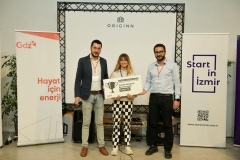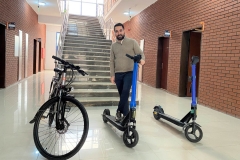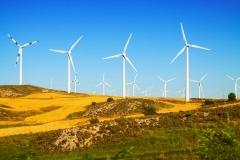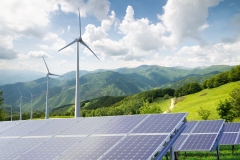
GRADUATE SCHOOL
Sustainable Energy (Without Thesis)
SEN 509 | Course Introduction and Application Information
| Course Name |
Energy Trading and Risk Management
|
|
Code
|
Semester
|
Theory
(hour/week) |
Application/Lab
(hour/week) |
Local Credits
|
ECTS
|
|
SEN 509
|
Fall/Spring
|
3
|
0
|
3
|
7.5
|
| Prerequisites |
None
|
|||||
| Course Language |
English
|
|||||
| Course Type |
Elective
|
|||||
| Course Level |
Second Cycle
|
|||||
| Mode of Delivery | - | |||||
| Teaching Methods and Techniques of the Course | - | |||||
| Course Coordinator | ||||||
| Course Lecturer(s) | ||||||
| Assistant(s) | ||||||
| Course Objectives | This course focuses on real-world applications and concepts with regard to energy trading and risk management; the course serves as a motivation and stimulation for actual / ongoing academicians and professionals willing to enter and work in the energy markets for academic research or professional career purposes. For that reason, real-world cases, practical applications and problems in the field of energy trading and risk management will be covered in the class. |
| Learning Outcomes |
The students who succeeded in this course;
|
| Course Description | Focusing on the fundamentals and structure of the global electricity market primarily, the course also investigates the dynamics of the price mechanism by using analysis and modelling tools. Besides the principles and successful show cases of portfolio and risk management among energy trade, electricity and carbon markets in details. In order to support the theoretical background, an online trading game will be conducted throughout the course as well. |
|
|
Core Courses | |
| Major Area Courses | ||
| Supportive Courses | ||
| Media and Management Skills Courses | ||
| Transferable Skill Courses |
WEEKLY SUBJECTS AND RELATED PREPARATION STUDIES
| Week | Subjects | Related Preparation |
| 1 | Basics and Structure of Electricity Markets | Lecture Notes and Presentation |
| 2 | Quantitative Methods in Energy Trading | Lecture Notes and Presentation |
| 3 | Supply Demand Fundamentals and Price Formation (Crude oil, natural gas and electricity) | Related articles will be assigned |
| 4 | Understanding of Fundamental Energy Market Price Drivers | Related articles will be assigned |
| 5 | Energy Trading I: Trading Markets, Exchanges and Trading Products | Lecture notes and presentations |
| 6 | Energy Trading II: Online Trading Game Introduction | Lecture notes and presentations |
| 7 | MIDTERM EXAM | |
| 8 | Asset-Based vs. Speculative Trading | Lecture notes and presentations |
| 9 | Electricity Portfolio Management | Lecture notes and presentations |
| 10 | Basic Energy Risk “Hedging” using Derivatives | Lecture notes and presentations |
| 11 | Electricity Risk Management | Lecture Notes and Presentation |
| 12 | Paper Presentations I | |
| 13 | Paper Presentations II | |
| 14 | Investment Opportunities and Strategies in Electricity Markets | Related articles will be assigned |
| 15 | Advanced Financial Derivatives in Energy Markets/ | Lecture Notes and Presentation |
| 16 | Carbon Markets, Trading and Risk Management / Online Trading Game: Final Results & Discussion, Announcement of Winner |
| Course Notes/Textbooks | |
| Suggested Readings/Materials |
EVALUATION SYSTEM
| Semester Activities | Number | Weigthing |
| Participation |
1
|
10
|
| Laboratory / Application |
1
|
10
|
| Field Work | ||
| Quizzes / Studio Critiques | ||
| Portfolio | ||
| Homework / Assignments | ||
| Presentation / Jury |
1
|
20
|
| Project | ||
| Seminar / Workshop | ||
| Oral Exams | ||
| Midterm |
1
|
25
|
| Final Exam |
1
|
35
|
| Total |
| Weighting of Semester Activities on the Final Grade |
3
|
65
|
| Weighting of End-of-Semester Activities on the Final Grade |
1
|
35
|
| Total |
ECTS / WORKLOAD TABLE
| Semester Activities | Number | Duration (Hours) | Workload |
|---|---|---|---|
| Theoretical Course Hours (Including exam week: 16 x total hours) |
16
|
3
|
48
|
| Laboratory / Application Hours (Including exam week: '.16.' x total hours) |
16
|
0
|
|
| Study Hours Out of Class |
15
|
5
|
75
|
| Field Work |
0
|
||
| Quizzes / Studio Critiques |
0
|
||
| Portfolio |
0
|
||
| Homework / Assignments |
0
|
||
| Presentation / Jury |
1
|
30
|
30
|
| Project |
0
|
||
| Seminar / Workshop |
0
|
||
| Oral Exam |
0
|
||
| Midterms |
1
|
32
|
32
|
| Final Exam |
1
|
40
|
40
|
| Total |
225
|
COURSE LEARNING OUTCOMES AND PROGRAM QUALIFICATIONS RELATIONSHIP
|
#
|
Program Competencies/Outcomes |
* Contribution Level
|
||||
|
1
|
2
|
3
|
4
|
5
|
||
| 1 | To improve theoretical and conceptual proficiencies as well as applied competencies on energy studies. | |||||
| 2 | To evaluate the problems and circumstances about energy systems by using theoretical and practical knowledge in fundamental disciplines of energy studies such as economics, natural sciences, political science, law, and sociology. | |||||
| 3 | To analyze multi-dimensional problems which are faced and unpredicted in energy system by taking over responsibility as an individual and a group member. | |||||
| 4 | To evaluate the relationships between factors in energy policies and applications such as structures, markets, institutions, regulations, climate change and environment in a critical perspective. | |||||
| 5 | To debate problems in sustainable energy development by identifying them. | |||||
| 6 | To argue positive and negative aspects of international affairs and geopolitics on energy. | |||||
| 7 | To examine the economic and political structure that energy systems are based on. | |||||
| 8 | To question the theoretical and empirical gaps in energy studies literature by developing original arguments in order to fill these gaps in the literature. | |||||
| 9 | To interpret the collected data that would measure the theories, scenarios and concepts as variables by using scientific research methods in energy sciences and sustainable energy development field. | |||||
| 10 | To prepare an original thesis/term project about political, economic, environmental, social and/or historical dimensions of sustainable energy and geopolitics in accordance with scientific criteria. | |||||
| 11 | To develop foreign language skills to be able to follow the literature on energy studies and to communicate with international scholars. | |||||
| 12 | To be able to use data and information in advanced levels in the field of energy sciences. | |||||
| 13 | To have ethical, social and scientific values in the stages throughout the processes of collecting, interpreting, disseminating and implementing data relevant to energy studies. | |||||
*1 Lowest, 2 Low, 3 Average, 4 High, 5 Highest
NEWS |ALL NEWS

‘Double award’ for energy efficiency
Izmir University of Economics (IUE) received a double award at the ‘Innovative Idea Development Workshop in the Electricity Distribution Sector’ organized with

International investment for ‘Scootable’
Emrecan Durmaz, a student of Izmir University of Economics (IUE), who developed the software infrastructure that enables electric scooters and bicycles to

‘Social' analysis of energy’
Prof. Dr. Mehmet Efe Biresselioğlu from Izmir University of Economics (IUE) has implemented the ‘Cure’ project with 2 countries to measure the

